
 |
|
Sunday, July 31, 2005
Thursday, July 28, 2005
Wolfowitz on G8 President Paul Wolfowitz and some senior Vice Presidents in the Bank held a forum today to discuss the G8 Summit in Gleneagles. Wolfowitz has released a statement. The forum was a bit like a talk show setting with Wolfowitz grabbing the mike and wandering over to those who wanted to add comments or ask questions. The questions were the usual, "how will debt relief help the poor man on the street?"; "how effective will debt relief from G8 be without similar relief from other donors?"; "how is the Bank planning to make sure we take advantage of the developments in G8 to boost our efforts to get real results in poverty reduction and economic growth in practice?"; "What about gender equality?"...you get the idea. All good questions and a lot of challenges and hard work ahead for the Bank. Belated Weekend Roundup Friday night the Kaiser Chiefs played at The 9:30 Club. There was some drinking and dancing before, during and after the concert and a good time had by all. Until I got in a thunder storm at two a.m. on the way home. At least I got to work off some of the beer calories by having to make a mad slightly staggering dash from metro to home. On Saturday I got up early (for a Saturday) and headed off with some friends to Sugarloaf Mountain. Wandering in the cool of the trees was a welcome break from the stifling heat of DC
And Sunday I made a trip to The Kennedy Center for the Six p.m. free concert of young musicians. They were amazing. Sunday, July 24, 2005
WHAT’S THE WORD ON KOREA: A REVIEW ON WRITINGS IN RECENT JOURNALS There are always articles covering a wide range of issues coming out about Korea. Predominant among the themes is the nuclear issue along with the six-party talks, non-proliferation, US relations to one or both of the Koreas, human rights and, perhaps less commonly, South Korean domestic policy. In the field of Korean studies there are a few core celebrities we can count on to produce quality work and we hope for new faces with some interesting takes. The National Interest,The Atlantic Monthly and The Washington Quarterly are my picks for the best writings on Korea on sale now. Starting with The National Interest, A-list celebrity in the field of Korean studies Nicholas Eberstadt of the American Enterprise Institute has a brief four-page article on, “North Korea’s Weapon’s Quest.” If you are familiar with Nick’s earlier writings and his recommendations for US policy this article is a must-skip. If you are not familiar as such, this is a good summary of his well-known position and arguments. The article re-covers Nick’s view of the pillars supporting and justifying the continued existence of the regime, i.e.: unification under North Korea's system, boot out the imperialist Americans, and preparation for the coming war, and goes on to link how these aims of nationhood fit with the North’s pursuance of nuclear weapons. This creates an overall picture of a regime that is not insane, but calculating and one that is logically pursuing a policy that will enable it to meet its objectives. As Nick states, “Despite the North Korean regimes seemingly freakish face to the world, the leadership’s ability to make subtle and skilful calculations is underscored by the bottom line negotiations with the US government over the past decade.” The conclusion is of course that given North Korea’s historical reasons for existing and its current objectives, negotiation is futile and possibly dangerous. Another appealing article in The National Interest is by Ted Galen Carpenter and Charles V. Pe?a entitled, “Rethinking Non-Proliferation.” Mr. Galen Carpenter is known for his recent book “The Korean Conundrum”, which he co-authored with Doug Bandow. I haven't read this book, but after reading this article it moved several notches up on my list of ‘to read’ books. The article starts off sanely enough by recognising that non-proliferation efforts do not appear to be working all that effectively at the moment and in fact, there are precedents that run counter to non-proliferation efforts. Reasons for failing to drive home a non-proliferation message include disingenuous actions of the US itself. Despite the best intentions that non-proliferation activism might have, the behaviour of the US “may seem threatening to nations that have a less than cordial relationship with the United States.” Failure in preventing proliferation was also credited to the counter-effective interpretation of events in Iraq by countries such as Iran and North Korea. And of course, examples of India, China, and Pakistan, all of which got improvements in their relations with the US after declaring themselves nuclear are cited as poor precedents for now standing up for non-proliferation. These arguments reminded me of Robert McNamara’s recent article in Foreign Policy. However, while Mr. McNamara advocated that all nukes need to be got rid of, Messrs Galen Carpenter and Pe?a went the opposite way advancing that proliferation ain’t such a bad thing. This point is argued by aligning non-proliferation rules to those of gun control ? strict gun control prevents peaceful people from getting guns to protect themselves, while the criminals get the guns regardless of the laws. That is to say, only the peaceful and stable countries like “Germany, Japan, Sweden and South Korea” are prevented from acquiring nukes while rogue regimes such as North Korea go on their merry way toward nuclearisation. Afterall, nukes don’t kill people, people kill people. This article would be funny if wasn’t so scary. In a country with possibly the laxest gun control laws in the world outside of war zones, and possibly the highest death rate by guns outside war zones, I don’t think US gun control policy is anything this world wants to follow when it comes to nuclear weapons. Most concerning is that the authors list of “stable democracies”. No nation is truly stable. I would hardly consider Taiwan to be a stable democracy, and South Korea for that matter. Even Japan which is currently having a revival of nationalism with the rise of right-wingers like Ishihara is hardly a stalwart of stability. And if you give all of them WMD at the same time, they are likely to lose their collective heads. All the more so if they think that the world’s most powerful military, the US, is backing them up. The argument also pressed that sale of technology and weapons to non-state actors would be a red line. However, the sale of technology by Pakistani rogue, Kahn and lack of any punishment proves how hollow and unworkable such an idea is. This certainly implies that the NPT needs to be better but its no argument for abandoning NPT. The Atlantic Monthly has a good commentary on the proceedings of a simulation ‘war game’ done concerning North Korea. The players were experts from various security, international policy, and academic backgrounds including Robert Gallucci famous for his role in devising the Agreed Framework, former IAEA nuke inspector David Kay, Lieutenant General Thomas McInerney, Jessica Mathew of the Carnegie Institute, and DoD guy Kenneth Adelman. It highlighted the key issues and presented the arguments that different positions with the government would push and points of view based on the players’ different backgrounds providing a big picture of the issues and arguments concerning the North Korea nuclear issue. The biggest concern, through consensus, was not the weapons as such but the threat of their sale to terrorist groups. The number of English articles on the divisiveness of domestic South Korean politics seems to be increasing. In TheWashington Quarterly Hahm Chaibong of Yonsei University provides an overview of the conservative versus progressives in Korean politics. It takes little discernment to see that Mr. Hahm is on the side of the conservatives. The bulk of the article is in the way of background on the rise of progressives to Korea’s political stage and is worth reading. The author characterises the progressives as anti-capitalist, anti-US, anti-Japanese, and pro-North. They are criticised for their anti-chaebol reforms undertaken during Kim Dae-Jung’s administration (which he indicates was only elected because of the turmoil created by the economic crisis) and its effect of Korea’s competitiveness. As for the Sunshine Policy, he argues that progressives’ view this policy as the best way to exclude the US from Korea’s pursuit of national self-determination. He argues that “infantile leftist nationalism … is wreaking havoc on South Korea’s economy and its alliance with the United States, the country’s two mainstays.” And as for their political future, “The progressives were able to enter the political mainstream because they were willing to make a pact with the devil by making strategic alignments with conservatives” and will continue to use “political rhetoric and ideology to manipulate selective affinity or confusion…to its advantage.” The following article in The Washington Quarterly is by Andrew Coe of the Institute for Defense Analysis. “North Korea’s New Cash Crop” is a great counter-argument to Ted Galen Carpenter and Pe?a’s article. Mr. Coe emphases the decline of the North Korean regime economy and analyses its sources of hard currency and recent trends in making more money. He concludes that from narcotics to counterfeiting, if the objective of the regime is to survive, then making money will be done by whatever means ? including weapons sales. Given this to be the case then, the potential are viewed for their attractiveness. Known buyers of North Korean arms include Egypt, Iran, Syria and Yemen. The potentials are listed as Tehran, Saudi Arabia, Taiwan and possibly Venezuela. And of course, a nod is given to the potential to sell to terrorist organisations. In this, Mr. Coe argues that it wouldn’t be a matter of the North having the “moral clarity” or fear for their own regime’s survival that would stop them from making such a sale but more likely, the terrorist organisations wouldn’t have sufficient funds to cut a deal. Friday, July 22, 2005
Conference on North Korean Human Rights, Washington DC July 19, 2005 For all the authoritative and comprehensive information on this event you need to go to One Free Korea. And as a further disclaimer I'm not involved in any organised charity on North Korean human rights and showed up merely as an interested and concerned person (not even a US citizen). Unlike "One Free Korea" I didn't have eleven pages of notes, I had a mere page and a half. And unlike OFK I do NOT consider starting 15 minutes late, breaks constantly eating into the sessions by 5-10 minutes and lunch that went half an hour longer than scheduled as being "like the Tokyo train system--on time, efficient". I would however, say that is was typical of conferences of this size and nature. 1. The Content The highlight was clearly Natan Sharansky and the testimonies of North Korean defectors and their helpers including Tim Peters and Rev. Chun Ki-Won. And kudos also needs to be given to the coverage which touched on conditions in Korean concentration camps, the plight of refugees in China, human trafficking and women's issues, and also Japanese abductees. This was further strengthened by the range of speakers which included charities and those directly affected, government - both US and South Korea, academia and church. There was no open floor Q&A during the conference. Although I regret this somewhat as I think it would've made it more interactive I also understand that the reason the schedule kept such clear focus was because it didn't open itself up to divergences that the audience may have taken us on. Also, with such a controversial issue, open floor may have gotten out of hand. 2. The Speakers As mentioned the defectors, Sharansky and Tim Peters were all very interesting to listen to. I should also put in Donna Hughes' account of human trafficking of women as among one of the best talks of the day. Senators Brownback, Leach and all the religious folks were good speakers per se but the constant dramatic pauses for gratuitous applauses was difficult to stomach. Deborah Fikes, Executive Director of the Midland Ministerial Alliance who claimed that the US government placed the genocide by Nazi Germany as a key reason US entered and fought in WWII needs to urgently read a basic history on the US government's approach and actions against genocide claims made during WWII. Even a simple trip to the Holocaust Museum may clear up some confusion for her. Dr. Kim Sang Chul of Save North Korea was fortunate not to have a coronary and as the audience it was a miracle we didn't all simultaneously blow our eardrums. Nobody knows what he said because he was screaming too much. In fact, of the speakers, the (mostly Korean and mostly religious) freaks who put on the afternoon show (3:30-5:00) where all too much for me to bear. I was planning to stay for the evening US politicians but couldn't stomach it anymore by this stage. The whole religious and political gang who kept on about "moral clarity" also started to get on my nerves as well. I don't need "moral clarity" to know that 2 million starving to death, execution for defection and concentration camps are "wrong". Frankly, that kind of term only serves to create a "holier-than-thou" attitude which will only serve to repel secular would-be activists. And praying is also a BIG NO in a conference. Being told to stand and hold hand has got to be the most off-putting turn of events I have ever encountered at a conference. About the speakers, I don't want to imply that the message was bad - indeed as mentioned the content was good and the topic is critical but the delivery at times made the SOME of speakers seem disingenuous. 3. The Audience This was a big crowd. Mostly Korean and, I'm guessing, predominantly involved or otherwise associated with either Freedom House of other charity groups that were taking part in the conference. As such, I viewed this event pretty much as a "preacher speaking to his choir" affair. I doubt that there were any among us who had not already read "The Aquariums of Pyongyang" and I'm guessing the majority had also read Sharansky's book. And like me who wrote only a page and a half of notes, I think the rest of the audience also heard very little that they didn't already know. 4. Conclusion My thoughts at the end of the conference were mixed. I'd had a gutful of politicians and preachers and was disappointed in the lack of new information but at the same time I was encouraged by the scope of people who were concerned about the issue and more convinced than ever that more needs to be done than simply holding conferences like this. My role in helping North Korea's people is not going to be served by attending these events or by joining groups like Freedom House but in my individual actions. Tuesday, July 19, 2005
South Korean Man Arrested for Trying to Smuggle Cocaine into Sydney I just heard this story on the radio. Lucky for this idiot Australia doesn't have the death penalty. Monday, July 18, 2005
Sigthseeing in Washington DC On Saturday I visited The Holocaust Memorial. This was a great museum except that they did not properly define the word "holocaust" and used the word "genocide" as if it meant "extermination", which it does not. Perhaps I was sensitive to the term due to the book I was reading but I agree with Ms. Powers that by setting the standard of genocide as equivalent to what happened to the Jews it becomes almost impossible to convince people to intervene before such a horrific level is realised. 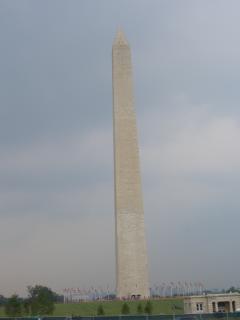 The Washington Monument The Washington MonumentAnd on Sunday, I made my way over to Arlington Cemetery. It was so stinking sweaty and humid I thought I was going to melt away but fortunately I survived. The most striking thing about this place, apart from being so quiet and picteresque in an eerie kinda way, is how large it is. This became more clear to me when I got lost and later realised I had only been wandering aimlessly through a very small section of the grounds. 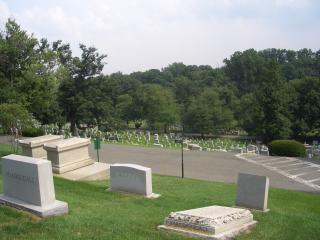 Arlington Cemetery Arlington CemeteryAnd so concludes my vacation. Tomorrow I'm back at work. Book Review "A Problem from Hell: America in the Age of Genocide" by Samantha Power Published in 2003 this book has long been on my reading list. Unfortunately my extensive "to read" list currently has a waiting period of 3-5 years before I get around to even priority books. However, I finally got around to reading this book and it is truly a powerful book. The most disturbing parts of the book, for me, was the inordinate amount of time it took for the US to even ratify the Genocide Convention. I checked Australia's own record on this as I was concerned that our deference to follow US lead may have made us equally shocking but thanks to Dr. Evatt Australia was among the very first, if not The first nation to ratify. Although what that has meant to Australia since ratification, I don't know. The other most disturbing part, for me, was US reaction to the Khmer Rouge in Cambodia during the Cold War. Although, I guess that my shock lies not in how US handled it, but in my own ignorance of the facts. Indeed for the Iraq, Rwanda and Bosnia, Sbrencia and Kosovo stories I was less shocked because I already knew the story. However, my shock over Cambodia quickly condensed into dissatisfaction, bordering on anger, as to my high school history education which blatantly has failed to educate me. Ms. Powers, whose bias is obvious in the book, outlines a clear argument against US apathy in its approach to genocide. She favours a more activist involvement in the future. Indeed, her name was listed at the Holocaust Museum in DC, which I visited on Saturday as having been recently to interview refugees in Darfur, Sudan to ascertain whether or not genocide was occurring. If there was any weakness in her argument it came during the Bosnia argument. In some cases she argued that a mere credible word from US would deter genocide but in Kosovo it was noted that even bombing was not credible enough in the first few days to be credible enough to deter. Although, it can be argued that the erosion of credibility through previous lack of action made even the bombing initially seem hollow. The complexity of the issue, in my mind, lies in the almost paradoxical idea that to prevent/stop genocide countries must use military force; ie: killing can only be stopped by killing - the crux of the matter lies in the "intent" of the killing. Saturday, July 16, 2005
Public Finance Symposium, Istanbul, June 6-8 For my recent trip to Turkey I did not write during the trip as I was too busy and ridiculously jet-lagged. I always thought people were so rude to sleep during conferences - if they are not interested they shouldn't come! However, for the first time I found myself guilty of this most impolite act. Not that I wasn't interested; my body simply shut down and no amount of caffeine was going to keep my eyes open. By the end of the conference though I worked out a few tricks to keep awake such as a brisk walk before the session out in the sun and taking notes of the session to keep body and mind active. At the end of the first day of the Symposium the Turkish counterparts took us all on a wonderful dinner cruise along the Bosphorus River. 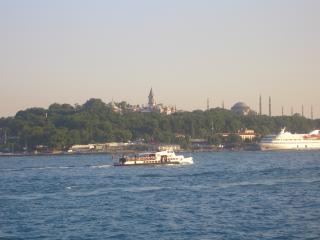 View from the boat on the Bosphorus View from the boat on the Bosphorus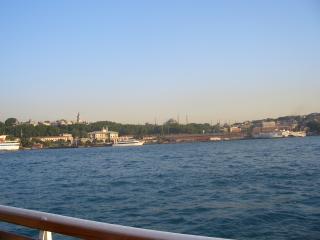 Another scenic shot Another scenic shot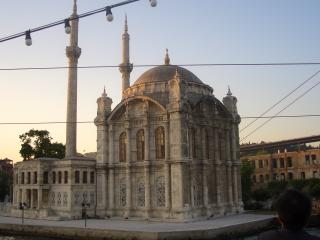 View of a palace from the boat View of a palace from the boatOn the final day, the conference ended after lunch giving my friend and me a full half day and evening to be proper tourists. We immediately set out to enjoy some sights. 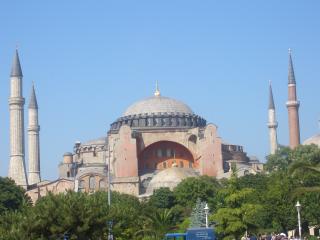 The Hagia Sophia The Hagia Sophia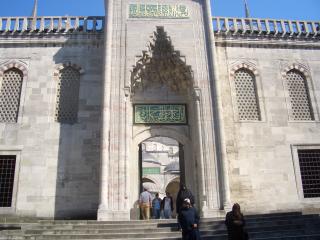 Outside the Blue Mosque Outside the Blue Mosque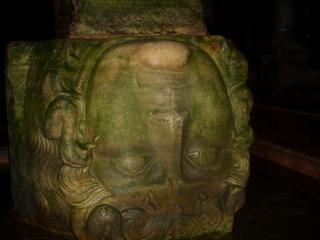 Upside down head of Medusa in the Basilica Upside down head of Medusa in the Basilica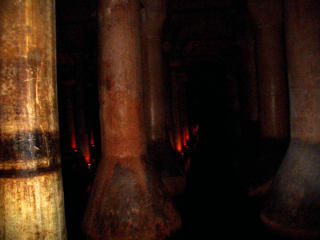 The Basilica The BasilicaAfter visiting the Blue Mosque, Hagia Sophia, and the Basilica we wandered the streets a while before having dinner and then finding a quaint little hof for a few too many beers. Visiting Lao and Turkey in quick succession highlighted how vastly different this world really is. These countries may as well be different planets but I loved them both and they both had a richness and beauty unique unto themselves. Friday, July 15, 2005
The Public Finance Workshop in Vientiane, Lao PDR Finally, I have time to get organised enough to post long overdue photos from my trips. Let me start with my mission to Lao in late May. While I was there, I attempted to write some goings on. Like most attempts in this regard, the attempt was aborted shortly after it began due to excessive workload and some degree of laziness. However, I will include what I did manage to write. It is only edited for typos but otherwise remains as I wrote it at the time. Mission to Vientiane, May 22-25 22 May 2005 I will, as I proceed, omit any work details as that is boring. So all the gaps in the schedule will indicate work time. Arrived in Lao PDR. Flying into Lao was enough for me to see that I had never been to a country quite like this. Descending into Vientiane, the capital, was like flying into a rural town, not a city. The very friendly and helpful staff from the Lao Plaza Hotel were waiting for me and two others to take us directly to the hotel via a shuttle bus. Riding along the streets showed people mostly on mopeds and tuk tuks zipping down the streets with seemingly very lax ideas of ??road rules.?? But traffic was light enough that the lack of organization seemed of little consequence. The first striking point was that not all the roads are paved in downtown Vientiane. The Lao Plaza Hotel is a quite lovely place. It does not have the luxury of some countries?? hotels but it is clean, has cable (currently watching a spot of Rugby Union on ESPN), a pool and gym area and other amenities expected of a nice hotel. On the afternoon of arrival a few of us took the car we have rented complete with a driver to take a tour around the city. This took very little time partly because one of the two tourist highlights was closed on a Sunday. The other place seemed closed too but doors were opened with a spot of dosh. We also drove past an impressive arch. Afterwards we took a walk by the Mekong River until we came to a known local hangout for tourists and expats by the river and enjoyed a Beer Lao, which is quite delicious and some squid and fried fish. Squid and fish because three of our group were Korean and what is beer without squid and fish, really? 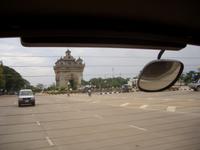 Impressive arch Impressive arch 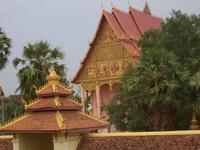 Sightseeing in Vientiane 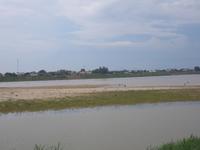 The Mekong River: opposite bank is Thailand The Mekong River: opposite bank is Thailand In the evening we had a light dinner in the hotel. They served up a massive plate of delicious food for a ridiculous price. This country is obscenely cheap ?? US$3 for something that would cost around US$20 plus tax in Washington. 23 May, 2005 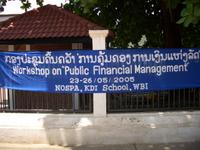 Banner announcing our presence Banner announcing our presenceFirst session of the workshop is about to start and the room is CROWDED! They are bringing in extra chairs to try and fit everyone in. This is great for the conference and is hopefully an early sign that it will be a big success. I have volunteered to take notes of the proceedings which has the added benefit of letting me blog as well. Also positive to note that there is a good representation of women among the participants. And so concludes my mission to Laos. There is a follow up workshop between the parties involved in improving public financial management in Laos that is due to be held in Seoul in September but whether or not I join that mission is very much uncertain at this stage. Fingers crossed. Thursday, July 14, 2005
Korea: Asia Hub or Asia Dud? It was reported today that FedEx has agreed to set up its Asia Hub in - no not the Asian Transport Hub otherwise known as Korea - but in China. Although the reports only tell the fact that FedEx has selected China, it would seem that Korea should not have let such a huge account slip by. Afterall, Korea is decades ahead in technology, skills, and infrastructure and is well-placed to serve China, Japan, Korea and where ever else in Asia. They have invested a fortune in various ports, least of which is Incheon Airport and the logistics arm of that massive plan. Its laws are more advanced and its stated ambition is to become the transport hub of Asia. Something is surely wrong in Korea's approach to achieving this ambition if they can't entice and win a contract to get FedEx to set up headquarters in Korea when they were clearly looking to move. Wednesday, July 13, 2005
Optimism Outdoes Reality in Lead Up to Six-Party Talks The Wapo has an article this am entitled, "South Korea Offers to Supply Energy if North Gives up Arms". What follows is a list of concessions, including all the electricity it needs, which the South is willing to give the North and which the North are not likely to accept. The gift list was praised by Condi Rice as a "very creative idea". Although what exactly is 'creative' about South Korea willing to give any bribe necessary to the North, escapes me. It also appears that receiving handouts from the South (and not US) would hardly result in the 'respect and sincerity' demand of North Korea being met. As the article duly notes, accepting these bribes and becoming wholly dependent on South Korean electricity would turn the "country into a vassal of its neighbour." The fact that North Korea has not even dignified the offer with a response indicates they may not be keen on the idea. With the six-party talks due to resume in late July I predict that, despite Condi's upbeat but rather empty comments, nothing will come of them, as before. Bribes coming from South Korea and not the US won't be acceptable and by now, the issue is beyond pretending that their real concern is only of energy supply. Thanks to Flying Yangban for the information on the NK Conference to be held here in DC. I registered and am looking forward to it. Friday, July 01, 2005
Work Stuff Through my work I had the good fortune to join in a trip to Lao PDR and Turkey. Both trips involved attending a workshop or symposium on public finance and my Unit has posted the materials from these trips on our public website for easy access. I have pics as well but have not had time to organise them into a coherent presentation worthy of public display. Other Stuff To update the trial period which is due to end on July 12, everything came to a crashing end in terms of thinking about the blog when I was informed that my close friend had passed away a few weeks ago. I am taking a couple weeks off work after today to deal with this. As for the blog, I have decided that it is going to stay and I'll work on some format/topic matters during my time off. The blog is more than just discussing Korea, it is a channel to update friends, to speak on issues I consider to be important/interesting, and to think through matters and sometimes get feedback on my ideas. The regularity of my writing and scope of readership must be secondary concerns to what this space is about.
|
Korea Blogs 
Newspapers |